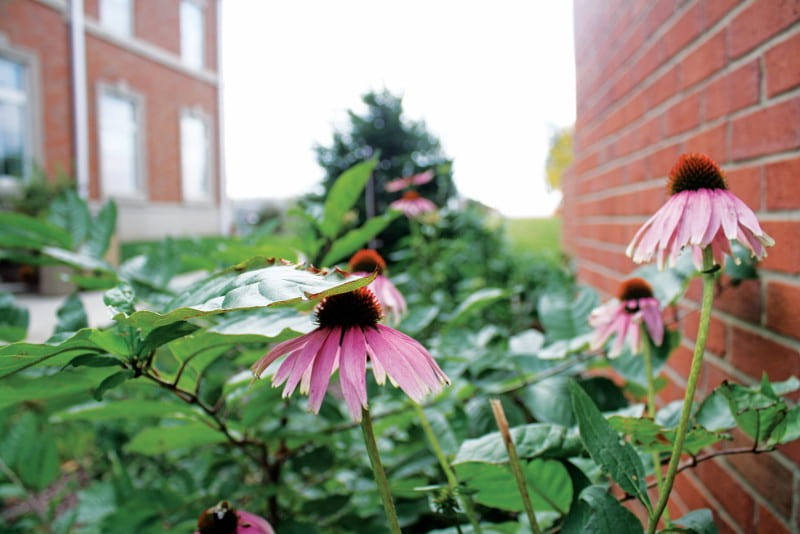By REBECCA FULTON – CENTO WRITER
Sustainability on Centre College’s campus has become a growing issue over the past couple of years, especially with the addition of the Environmental Studies minor. Since 2012, Centre has received two grants from the Environmental Protection Agency (EPA) to be used for composting and promoting sustainability on campus.
Officially called the Interdisciplinary Environmental Sustainability Across All Curricula, the grant was given a more colloquial name by John C. Walkup Professor of Chemistry Dr. Preston Miles.
“We call it the Composting Grant,” Dr. Miles said.
This grant started out as a way to fund the beginning of a composting program on campus. The initial $27,000 was used to buy the needed equipment and supplies.
The initial author of the grant was faculty member Cindy Isenhour, who has since left the project and its implementation in the care of Dr. Miles to become a faculty member at the University of Maine.
Since her departure, Dr. Miles has been at the helm of the project.
“The actual composting equipment is located on the parking area behind the Campus Center,” Dr. Miles said.
The in-vessel composting units were set up to run in the fall of 2013, and their first year composted six tons of food and wood material from Cowan Dining Commons and all across campus.

Associate Director for Corporate and Foundation Relations Kathryn Bowles also was part of the efforts in helping to receiving the grant.
“I communicate directly with the EPA,” Bowles said. “I helped [the other faculty] shape the idea into a grant proposal.”
However, Bowles’s part of the process is more on the financial side, and she was the one to get the initial call from the Environmental Protection Agency (EPA).
“The EPA identified Centre as benefitting by this program,” Bowles said. “They told me, ‘we have money, do you want some?’”
When the opportunity came along to extend the grant in 2013 to a total of $36,000, Centre reapplied and was granted the extra money. This extension of the grant money would be used to educate and encourage sustainability on campus.
“We shifted the emphasis from composting to other ways to promote sustainability,” Dr. Miles said. “This allowed for a curriculum impact.”
A portion of this new grant money was also given to faculty and staff to fund their own sustainability projects. Assistant Director of the Center for Career and Professional Development Mindy Wilson used this to make changes in Old Carnegie.
“I replaced four of the five thermostats in Old Carnegie with five plus two thermostats, like what a lot of people have in their homes,” Wilson said.
These thermostats are programmable, allowing the temperature to be set at a certain value during the day and then get automatically turned down during the night.
This allows the building to use less energy to keep it heated or cooled during times when no one is using it.
“We were wasting energy and money by keeping the temperature the same,” Wilson said.
As for other ideas, Wilson has her sights set on
“I’d love for everyone to have two bins in their office for trash and recycling to help stay sustainable,” Wilson said.
Technical Director and Scene Shop Supervisor Drew Maciula used a portion of the grant money to help get the Centre Garden behind the Emeritus House flourishing again with more students involved.
“I had to reboot and look for new options,” Maciula said. “I researched and read sustainable farming and gardening literature.”
Maciula became involved because he and his wife were looking for more easily to come by sustainable food sources.
He also thought of his concern for the future of where food will be coming from, and what life will be like for his young daughter when she grows up.
Maciula enjoys getting the students involved with the project and using food from the garden.
“I had access to [Dr. Miles] and the Environmental Club,” Maciula said. “It’s great to reconnect with students. This is a food source for the students to use.”
The faculty and staff were also given the opportunity to attend a three day workshop over the summer to learn about sustainability.
“We met as a group in the morning, then took a field trip in the afternoon,” Wilson said.
They had the chance to visit the Mother Ann Lee Hydroelectric Station, which supplies Centre with its power.
“We canoed down to the station, and were given a tour,” Wilson said.
The other field trip included an excursion to Clark’s Run with a guide.
“She showed us how the river was polluted,” Wilson said.
Overall, the faculty and staff workshop has worked well for everyone, providing invaluable insight into conservation through experiences.
“We got to see how Centre connects with the local community,” Maciula said.
This is only one step in the direction of sustainability, and Centre still is finding ways to improve.
“There’s a slowly growing mindset,” Bowles said. ”This is another rung on the ladder.”
